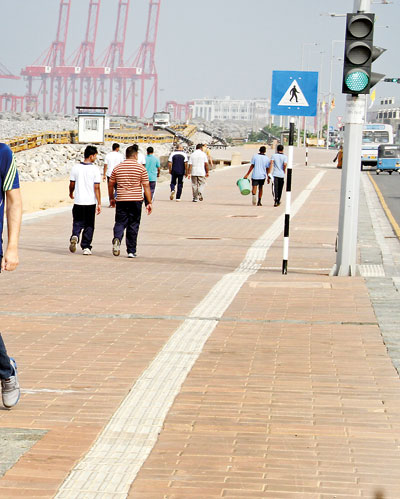News
Government hobbling along on providing access for less-abled
For Ranjith Wijesinghe, every day is a challenge. He is visually impaired by birth and depends on public transport to go anywhere from his home in the suburbs of the city, Maharagama.

Pavement opposite Galle Face Green: A special walking guide for those whose sight is impaired and use the white cane. Pic by Indika Handuwala
Now retired from teaching, he said he had not experienced any significant improvement in access for people with disabilities, although many laws and regulations have been passed.
“Every day I have to ask someone’s assistance to get into the bus. Most of the time people are very helpful towards people like us, but there are some who regard us as ‘problem’. We don’t need sympathy, we just need empathy,” Mr Wijesinghe said.
Since Mr Wijesinghe is preparing to visit his colleague in Kurunegala this weekend by train, he said he will have to ask someone to help him get on to the railway platform because there are no ramps at the Colombo Fort station.
In the north, the Social Services Development division at Jaffna District Secretariat have received complaints from disabled persons that some buses and three-wheelers would not stop for them.
Not having access to public spaces, buildings, retail stores, restaurants and the like, is a serious problem.
Engineer M A P Hemachandra, chairman of the National Transport Commission admits the deficiencies in accessibility but said progress will be made.
“When new bus terminals are built or railway stations are renovated or built, guidelines will be issued to make sure there are facilities such as ramps and separate wash rooms,” he said.
According to data from the Department of Census, 1.7 million people of 5 years or more have some form of disability in Sri Lanka based on a 5 years or above population of 18.6 million.
There are 997,000 visually impaired and 734,213 with walking difficulties. The largest number of less abled are in the Gampaha district at 163,369. Colombo follows with 150,325.
Though Sri Lanka became one of the signatories to the United Nations Convention on the Rights of Persons with Disabilities in 2007, the ratification was done only in February last year. Activists campaigning for access are sceptical and noted that the government is yet to implement the convention.
Over the years, Sri Lanka has presented many regulations and policies to ensure the equal treatment of persons with disabilities including a comprehensive National Policy on Disability which was introduced in 2003, but implementation is lacking, activists complain.
The Supreme Court handed down a landmark verdict on a fundamental rights petition filed by Dr Ajith Perera, directing the government that all its institutions and public buildings be made accessible for persons with disabilities.
In addition to the state sector, the courts also noted that the private sector also should also follow the recommendations.
Cyril Siriwardana, an executive member National Council and National Secretariat for Persons with Disabilities told the Sunday Times that he believes the main reason for the lack of interest in issues faced by disabled persons is that they are not prioritised in development goals.
“When the government’s priorities are infrastructure development and other things, we find it difficult to turn their attention to our issues.
Also, all the policy decisions taken in the past to uplift the conditions of disabled persons was a collective responsibility involving all ministries such as health, transport in addition to Ministry of Social Services, but they have failed,” he says.
However, Mr Siriwardana acknowledged that access for disabled persons in new buildings, hotels and public places has improved, but most state institutions and private companies have failed.
Meanwhile, the government issued new regulations last month to ensure that visually impaired persons are provided with equal and adequate access like any other person.
An amendment, which is to be incorporated into the sections 12 and 13 of the Protection of the Rights of Persons with Disabilities Act, No. 28 of 1996 was gazetted this week with comprehensive regulations on the use of the white cane and accessibility of Persons with Disabilities.
“The visually impaired person shall have the same right as ordinary citizens to the full and free use of streets, highways, sidewalks, public buildings, public facilities and other public places; they are also entitled to full and equal access, as other members of the general public, to all housing accommodations offered for rent or lease subject to the conditions and limitations established by law,” the gazette detailed.
Accordingly the White cane, which is used by visually impaired persons to walk should be rigid or collapsible with white in colour or tipped with red. Drivers and passengers are instructed to take precautions when such persons carry extended or raised canes at pedestrian crossings.
While welcoming the initiative, P A Gunawardena, project officer of the Sri Lanka Federation of the Visually Handicapped, said the government has taken steps to ensure that adequate facilities for disabled persons are provided in new buildings.
“Government policy on ‘mobility orientation’ for persons with disabilities is commendable though it is not up to the standard. However, all new buildings being built now incorporate facilities for easy access to visually challenged people,” he said.
In keeping up with the Protection of the Rights of Persons with Disabilities Act No. 28 of 1996, a separate gazette was issued in 2006 to provide accessibility facilities in institutional levels and all existing public buildings, public places where common services are available equipped with special arrangements.

